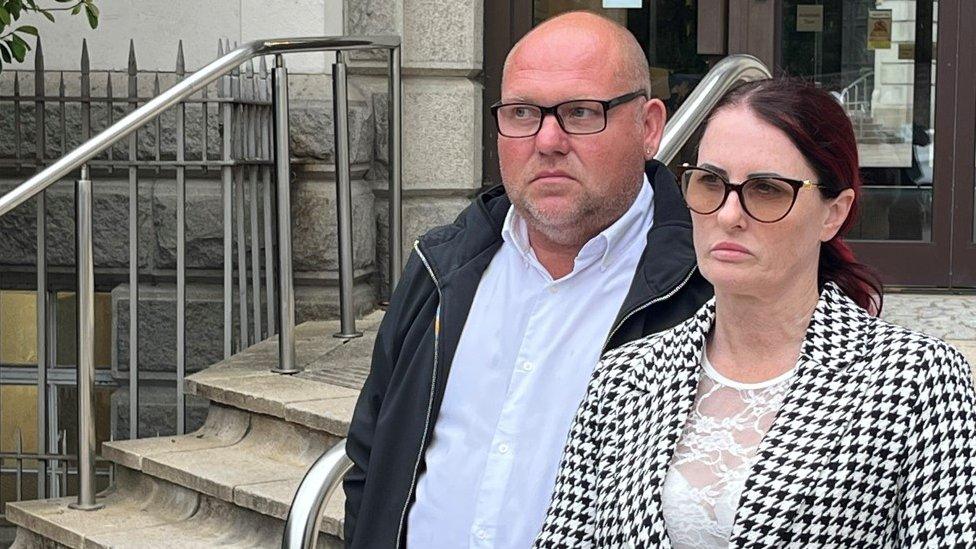Herpes deaths: Families vow to 'fight for truth' after inquest
- Published

Samantha Mulcahy (left) and Kimberley Sampson died weeks apart after being operated on by the same surgeon
The families of two women who died from herpes after having Caesarean births have vowed to "fight for the truth".
Kimberley Sampson and Samantha Mulcahy died six weeks apart in 2018 in hospitals run by East Kent Hospitals Trust.
The same obstetrician carried out both procedures, the inquest heard.
Coroner Catherine Wood ruled that the pair died of multiple organ failure as a consequence of herpes, acquired before or around the time of birth.
Ms Mulcahy's mother Nicola Foster said she will consider a judicial review over the findings, saying the inquest gave "no answers".
Tracey Fletcher, chief executive of East Kent Hospitals Trust, expressed her condolences to the families and apologised for the "additional and unnecessary suffering" the trust had caused.
Ms Sampson, 29, gave birth at the Queen Elizabeth the Queen Mother Hospital in Margate in May 2018. She was transferred to King's College Hospital in London where she was diagnosed with a catastrophic herpes infection, but died on 22 May 2018.
In July that year, first-time mother Ms Mulcahy, 32, died from an infection caused by the same virus at the William Harvey Hospital in Ashford.

Ms Mulcahy's mother Nicola Foster said she believed her daughter contracted the virus in hospital
Speaking after the inquest on Wednesday, Ms Foster said: "We will always believe that Kimberley and Samantha died due to contracting this virus in hospital. This inquest has given us no answers.
"The simple solution should have been to test staff, but that didn't happen. We could've had those answers five years ago.
"We will continue to fight for the truth."
'Rebuild your lives'
The surgeon, who cannot be named for legal reasons, previously told the inquest his hands were fully scrubbed, double-gloved and he wore a mask during procedures.
A reporting restriction preventing identification of the surgeon was upheld after being challenged by the PA news agency and BBC, with Ms Wood saying she would prefer to err on the "side of caution" and the public interest in naming the surgeon was "significantly reduced" after she ruled he was unlikely to have been the source of infection.
At the conclusion of the inquest in Maidstone, Ms Wood ruled that both mothers died as a result of multiple organ failure, caused by dissemination of the virus HSV-1 or herpes simplex, a common infection that can cause sores around the mouth or genitals, but if contracted after giving birth, is "a potentially fatal disease", Ms Wood said.
"I hope you can try and put this stage behind you and rebuild your lives," she told the families.
"There is nothing I can do or say that can bring back your loved ones. And I'm sure they will never be the same again.
"I know these are not the answers you were all hoping for."
Ms Wood previously gave a summary of her findings, suggesting both women could have been given an antiviral treatment sooner, and that, particularly in Ms Mulcahy's case, "suspicion should have been raised" given the knowledge among staff of Ms Sampson's earlier death.
Ms Fletcher said that since 2018, East Kent Hospitals Trust had made changes to the way it worked to ensure that if such a rare infection arising from this virus was suspected, it would be treated more quickly.
She apologised that the trust failed to answer questions after Kimberley and Samantha's deaths and contributed to the delays in their inquests being heard.
"We are changing the way we respond when things go wrong, including how we support and involve families," she added.
Ms Fletcher said she knew there was "more to do" and the Trust was working to improve maternity services to provide women and families with "the high standard of care, compassion and openness they deserve".
The coroner told the inquest that she planned to issue a Prevention of Future Deaths report.

Follow BBC South East on Facebook, external, on Twitter, external, and on Instagram, external. Send your story ideas to southeasttoday@bbc.co.uk, external.
Related topics
- Published14 July 2023

- Published27 April 2023

- Published26 April 2023

- Published25 April 2023

- Published20 April 2023
